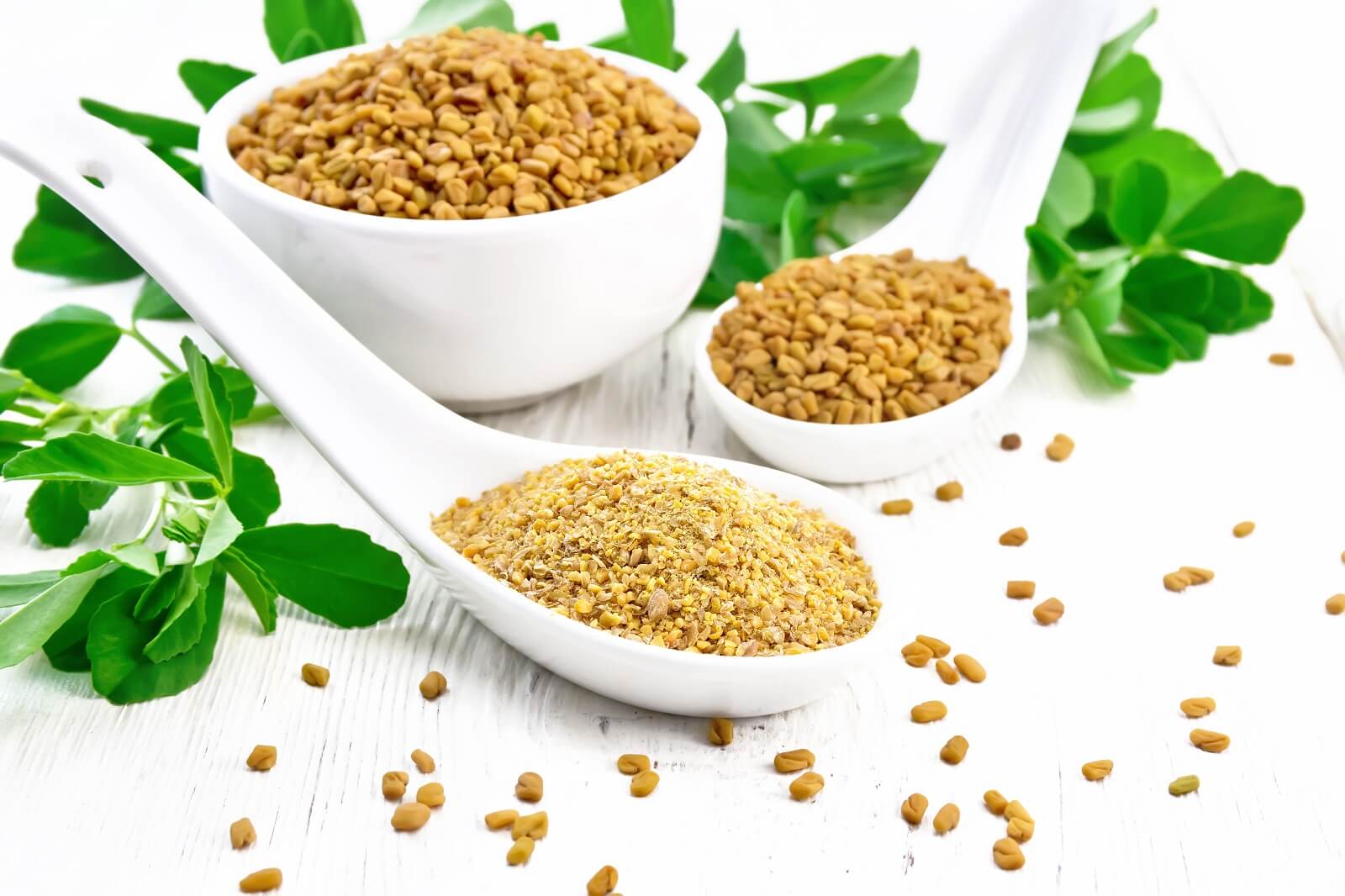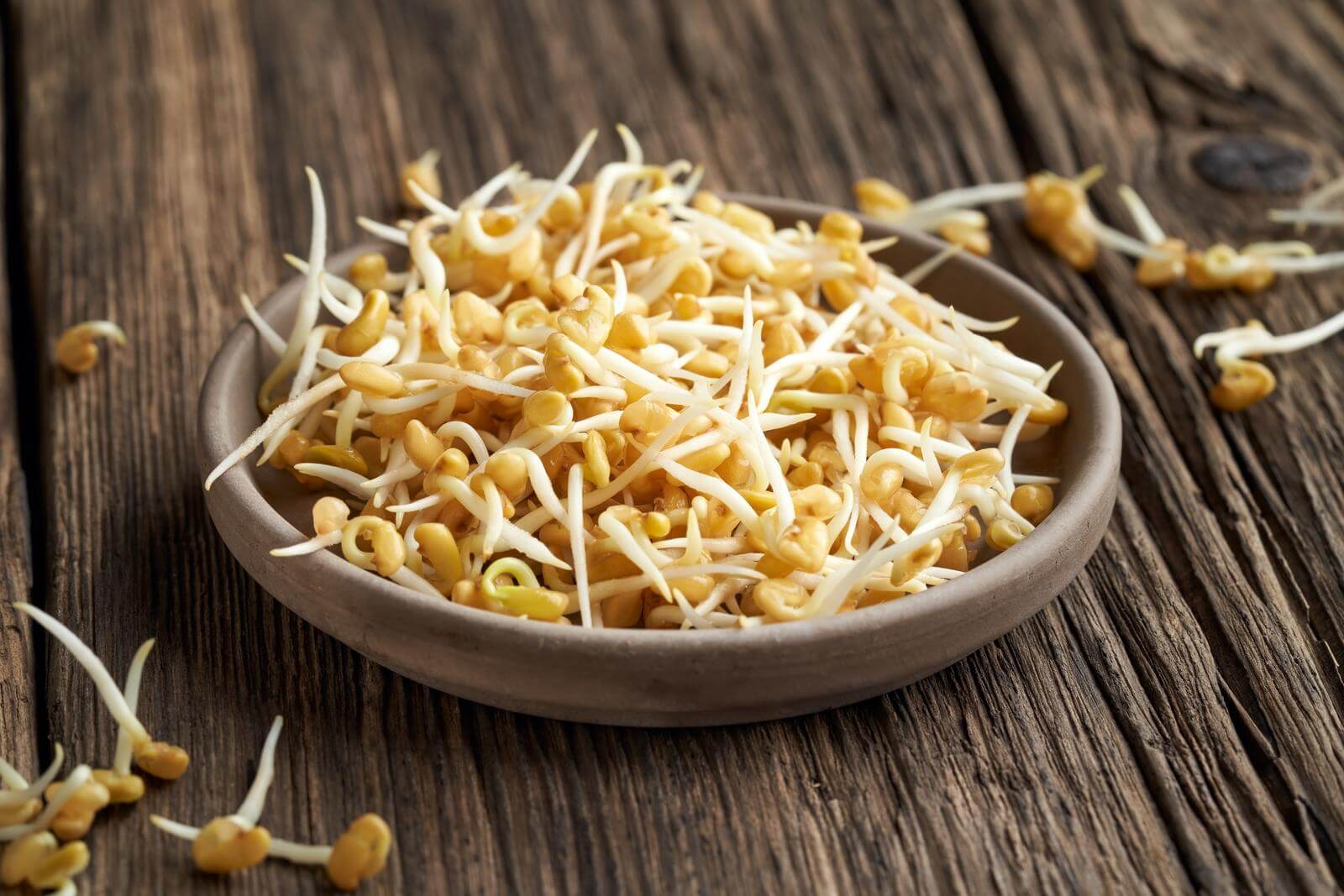
Fenugreek (Trigonella foenum-graecum) can be used as a laxative and a treatment for constipation. But, the part of the plant that is used is the seeds; which are very high in fiber and have fluid absorbing mucilage. Fenugreek helps to speed up intestinal transit and soften the stool; helping you pass a stool comfortably.
Also, fenugreek seeds are what are used for constipation, and will be referred to in this article at times as just "fenugreek."
Fenugreek may not help you pass a stool as quickly as a powerful laxative like aloe vera, but it will do it in a much safer way. Aloe and other laxative herbs contain strong laxative chemicals called anthraquinones; and the results of using them can be uncomfortable!
Also, repeated use of anthraquinone laxatives can result in becoming dependent upon them; therefore, use them as a last resort. For a more long term, stable approach to dealing with constipation, herbs like fenugreek are a great choice.
How to use Fenugreek for Constipation
The late Dr. James Duke (more about Dr. Duke from the USDA), an expert on herbal medicine, discussed using fenugreek for constipation in his book The Green Pharmacy.(source 1)
Dr. Duke cautioned that fenugreek seeds should only be taken in doses of no more than two teaspoons (about 5 g) at a time. The reason for this is that more than that dose can cause abdominal irritation. And, Dr. Duke suggests drinking plenty of water when you do use this herbs, to keep your bowels moving.
A 2014 review study published in the Nutrition Journal(source 2) investigated 10 different clinical trials involving fenugreek and discussed dosages. The review found the daily dose of fenugreek seeds ranged from 1 g to 100 g; with an average dose of 25 g. The study said medium doses of fenugreek seed powder were 5 g and high doses were 25 g.
Samuel Bart’s Digestive Health Solution
Samuel Bart has always been passionate about plants and their ability to keep us healthy. He has put together some of the best natural ways that could help anyone support a healthy digestive system.
Samuel perfected an easy, yet powerful formula, which consists of amazing ingredients. Bart’s supplement is backed by a ironclad 60-day, money back guarantee.

Fenugreek’s Ability as a Laxative

Fenugreek is a bulk laxative due to its high mucilage content. According to one 2018 study in the Journal of the Saudi Society of Agricultural Sciences(source 3) fenugreek contains 28% mucilage and 14.5% dietary fiber (from a total of 58% carbohydrates of which about 25% is dietary fiber).
According to C.P. Khare, in the 2004 book Indian Herbal Remedies,(source 4) the mucilage content of fenugreek ranges between 25% and 40%; and, 45% to 60% carbohydrates which is mainly comprised of mucilaginous fiber (galactomannans).
Mucilages in general help to increase the mass of your stool and also speeds up intestinal transit; in essence they are laxatives. Additionally, an added benefit is the water retaining capability of this substance delays stomach emptying at a gastrointestinal level; resulting in a feeling of fullness.(source 6)
A 2016 study in the Journal of Evidence-Based Complementary & Alternative Medicine(source 5) stated the laxative effect of this herb is due to the mucilage component.
A 2008 study in the Journal of Herbal Pharmacotherapy(source 7) states: Fenugreek fibers are not fermented by human colonic bacteria, and therefore may possess a laxative effect.
Guaranteed 24 Hour Constipation Relief
Dr. Scott McLeod, PharmD received his doctorate from the WSU College of Pharmacy. His book on constipation is guaranteed to show you how to get relief in 24 hours or less-or your money back (60 day, 100% refund guarantee).
Everything used in this plan is from nature. No use of harmful laxatives. People who have used these say they work BETTER than over-the-counter laxatives!

Research on Fenugreek for Constipation
A 2016 study in Nutrition and Food Sciences Research(source 8) states fenugreek could be useful for constipation; and, also may be able to stymie the onset of diverticulitis and diverticulosis.
The reason this herb is good for constipation is due to its ability to promote the transit of intestinal material due to how it ferments in the colon. It also helps hold water in the waste and thereby softens the stool. Also, it adds bulk to the stool.
A 2006 study in Food Reviews International(source 9) talks about the fiber in this herb and its benefits for the digestive system.
The study states that the dry weight of fenugreek seeds is composed of nearly 50% edible dietary fiber. 100 g of fenugreek seeds have 50 g of fiber as a result. The fiber of the seeds is composed of 20% soluble and 30% insoluble fiber. And, the recommended daily allowance (RDA) for fiber is 20 to 30 grams.
The RDA is a US measurement, and is straightforward to explain. According to the US National Library of Medicine Bookshelf,(source 10) the RDA is defined as:
Recommended Dietary Allowances (RDAs) are the levels of intake of essential nutrients that, on the basis of scientific knowledge, are judged by the Food and Nutrition Board to be adequate to meet the known nutrient needs of practically all healthy persons.
Recommended Dietary Allowances: 10th Edition
Concerning constipation, the Food Reviews International(source 9) study states this herb reduces the risk of constipation, makes passing a stool very comfortable and easy, makes colon transit time very brief, and helps with regularity.
Because of these benefits, the study also states that fenugreek lowers a person’s risk for hemorrhoids, diverticulosis, and anal fissures.
A 2021 review study in Mini Reviews in Medicinal Chemistry(source 11) also states that fenugreek is good for constipation.
The 2020 book Ethnopharmacological Investigation of Indian Spices(source 12) talks about this herb’s use for constipation, saying: Fenugreek fiber could be effective for curing constipation and stops the growth of diverticulosis.
The 2021 book Fenugreek: Biology and Applications(source 13) says fenugreek prevents constipation.
Naturally Treat Hemorrhoids in 48 Hours
Jessica Wright’s unique 5-step, all-natural approach to hemorrhoid treatment delivers permanent relief. Heal hemorrhoids in 48 hours, and eliminate the root cause in 30 to 60 days.
Benefit from Jessica’s 12 years of research; her book is backed by a 60 day, 100% money back guarantee.

A Natural Digestive System Supplement that Helps

If you have been struggling with digestive problems like constipation, you should know about Samuel Bart. Mr. Bart lives with his wife, Alma, in Nashville, Tennessee.
Mr. Bart has always had a passion for plants and how to use them medicinally. He went on to research some of the most effective ways that could help people support a healthy digestive system.
To this end, Mr. Bart developed a product he calls “SynoGut.”
Every capsule of this supplement is made in the USA, in a FDA approved, and GMP certified, facility under sterile, strict, and precise standards. Synogut capsules are non-GMO. You can rest assured that they do not contain any dangerous stimulants or toxins, and more importantly, they are not habit forming.
His proprietary blend blend contains the following ingredients:
- Psyllium husk
- Bentonite clay
- Black walnut hull
- Oat bran
- Flaxseed
- Prune fruit
- Aloe vera leaf
- Lactobacillus acidophilus (a probiotic bacteria)
- Apple fruit pectin
- Glucomannan root
If this is not the first time you have had constipation, you might benefit from the power these natural items can provide. And, if you have had prolonged constipation, utilizing a supplement like Mr. Bart’s could help you become more regular—without an arsenal of prescription drugs.
Many people have tried synthetic drugs to solve their constipation issues; and if these didn’t work, it may be hard to invest in a natural remedy like SynoGut. To this end, Mr. Bart offers a 60 day, full refund guarantee on his supplement.
If you decide to invest in Mr. Bart’s supplement, and are not satisfied with the results, you can quickly request a refund. SynoGut will promptly refund your purchase; ensuring there is no risk to give Mr. Bart a chance.
SynoGut is sold via the large online retailer ClickBank—a company based in Boise Idaho, USA. ClickBank sells products across the world, and ensures you can get a refund if you are not satisfied with SynoGut’s results.
If you are in a situation where you have “tried everything,” SynoGut is worth the quick purchase and a solid test drive. If you would like to learn more about Samuel Bart’s SynoGut supplement, you can do so at the SynoGut website.
About the Author
Geoff Kent is a natural medicine enthusiast who has been researching and writing about natural medicine since 2008. Geoff is primarily a web developer, but also researches and authors written and video content about natural health. Geoff has a bachelor’s degree in Management Information Systems from the University of Northern Iowa.
More on Geoff KentImportant Disclosures & Disclaimers
It is important to use the information you find on Herbsey.com in the right way. Also for legal reasons, these disclaimers and disclosures are necessary. For further information about each, feel free to click the link provided to the page on this website that provides more information.
Medical Disclaimer
The information on this website is not a prescription for anyone. This information is for informational or educational purposes only, and is not a substitute for professional medical advice or consultations with healthcare professionals.
Advertisement Disclosure
Some of the links provided on this article and website are affiliate links. If you purchase a product after clicking on these links, Herbsey.com will earn a commission. Herbsey.com promotes various products through advertisement and text links. For more information: Our Advertisements.








